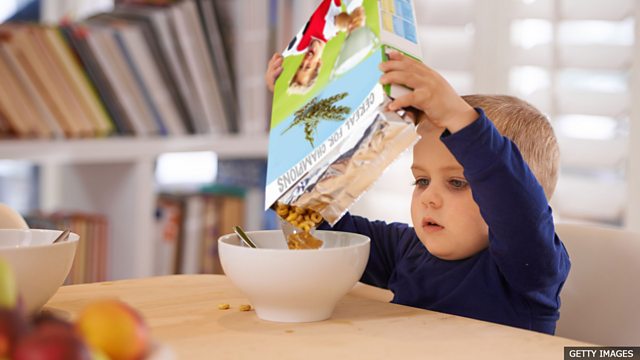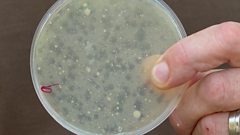6 Minute Grammar – Past simple
Did Sophie have breakfast? Find out in 6 Minute Grammar – Finn brings you past simple explanations and examples, while Sophie eats biscuits…
Finn
Hello. Welcome to 6 Minute Grammar with me, Finn.
Sophie
And me, Sophie. Hello.
Finn
In today’s programme we’re talking about the past simple tense…
Sophie
… when we use it, how we form it for regular verbs…
Finn
… and we’ll take a look at some irregular verbs, negative sentences and questions.
Sophie
… and we’ll finish as usual with a quiz.
Finn
Ok – so let’s get started! The past simple is a tense in English that we use to talk about an event that happened and finished in the past. Here’s Neil with our first example:
Neil
Jack Dorsey invented Twitter in 2006.
Sophie
Thanks Neil. Now, we often find the past simple in stories like this:
Neil
The boy started running. Suddenly, he stopped and listened…
Finn
Wow – sounds like an exciting story! And it had three past simple verbs: started, stopped, and listened.
Sophie
… and they are all regular verbs. We make the past simple of regular verbs by adding an ‘e’ and a ‘d’ to the infinitive.
Finn
… so the past simple of start is started,
Sophie
… the past simple of stop is stopped,
Finn
… and the past simple of listen is listened…
Sophie
… did you spot the difference in the pronunciation there?
Finn
Yes, sometimes the ‘e’ and the ‘d’ at the end sounds like a ‘t’. ‘t’. Listen: Stopped. Stopped.
Sophie
Sometimes it sounds more like ‘id’. ‘id’. Started. Started.
Finn
… or like a ‘d’: Listened. Listened.
Sophie
Let’s hear all three again:
Neil
Stopped, started, listened. Stopped, started, listened.
Finn
Thanks, Neil. So, listen out for those 3 different pronunciations of the past simple e-d ending. It’s simple, isn’t it…
Sophie
Yes, well we are talking about the past simple, but irregular verbs are not quite so simple.
Finn
That's true: can you give us some examples of irregular verbs, please, Neil?
Neil
I went to the interview yesterday and got the job!
Finn
Very nice. Congratulations. And another one please?
Neil
Kurosawa made some wonderful films.
Finn
So the past simple of go is went.
Sophie
...get is got.
Finn
...and make is made.
Sophie
And I’m afraid you just have to learn irregular verbs. There is no one simple rule for them.
Finn
But the good news is that the past simple is the same for all people.
Sophie
Yes – it’s I got the job, you got the job, he got the job…
Finn
We got the job… they got the job…
Sophie
Everybody got the job!
Both
Hooray!
IDENT
6 Minute Grammar from the 蜜芽传媒.
Finn
Now, for negatives in the past simp… Sophie, are you hungry?
Sophie
Yes, sorry, I didn’t have breakfast this morning.
Finn
You didn’t have breakfast! Aha! … past simple negatives … this is simple… you just put didn’t in front of the main verb.
Sophie
That’s right. Didn’t plus the infinitive makes a past simple negative: I didn’t have breakfast this morning.
Finn
So remember: it’s not I didn’t had, it’s I didn’t have breakfast.
Sophie
I didn’t have breakfast. I didn't have time!
Finn
Now, let’s move on to past simple questions. Here’s an example:
Neil
Did you make that cake? It’s delicious!
Sophie
Did someone say ‘cake’? Where?
Finn
Sorry Sophie, it was just the example! So in past simple questions it’s did plus subject plus an infinitive: Did you make? Let’s hear that again – with an answer this time:
Neil
Did you make that cake? It’s delicious!
Finn
Yes, I did.
Sophie
Or we could say: No, I didn’t. For short answers, just drop the verb and use the subject with did or didn’t, so it’s Yes, I did.
Finn
Or: No, I didn’t. Good! Now for a quiz. I’ll say a sentence in the present simple and you change it to the past simple. Here goes: We start work at 10 in the morning.
Sophie
Ok, in the past simple it’s: We started work at 10 in the morning.
Finn
Great! Number 2. Here’s a sentence in the past simple: you have to make it negative. Ready? Scientists found a cure for the disease.
Sophie
And the answer is: Scientists didn’t find a cure for the disease.
Finn
And finally, I’ll ask a past simple question. Can you give me a short answer, Sophie: Did you have breakfast this morning? Did you have breakfast this morning?
Sophie
No, I didn’t. Or I could say: Yes, I did. Finn, what did you have for breakfast?
Finn
Well, I had cereal, eggs, toast, orange juice … coffee, croissants …
Sophie
Stop, stop! I’m so hungry… There’s more about this on our website at bbclearningenglish.com. Join us again for more 6 Minute Grammar.
Both
Bye.
Duration:
This clip is from
More clips from 蜜芽传媒 Learning English
-
![]()
蜜芽传媒 Q&A of the Week “你问我答”:搭配 “all but” 的用法
Duration: 04:51
-
![]()
蜜芽传媒 Phrasal verbs for travel:与 “旅行” 相关的短语动词
Duration: 02:14






